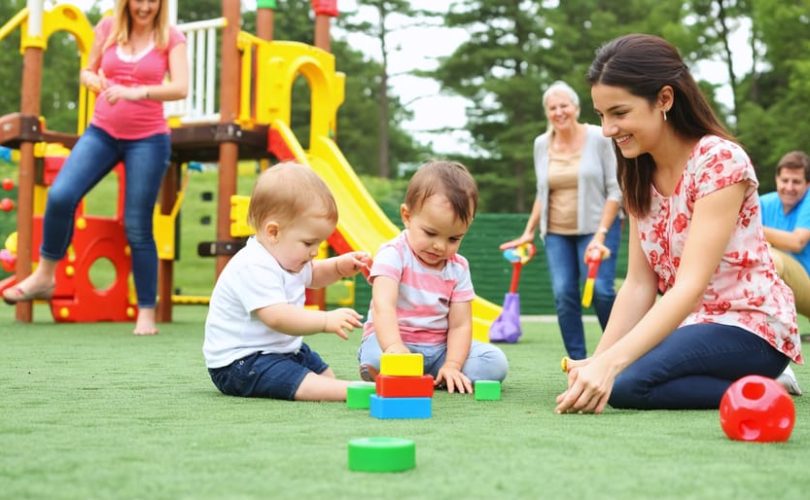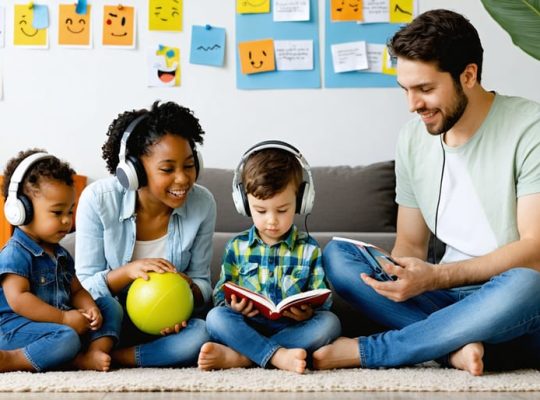Watching a child navigate their first friendships, master conversations, and develop emotional bonds creates both excitement and concern for parents and caregivers. Social development shapes not just childhood experiences, but builds the foundation for lifelong relationships, emotional intelligence, and mental wellbeing.
From the first baby smiles to complex teenage friendships, children progress through distinct social milestones that transform them from dependent infants into confident, socially capable individuals. Understanding these developmental stages empowers parents to provide the right support at the right time, ensuring children build strong social skills while feeling secure and validated in their journey.
Whether your child is taking their first steps into daycare or navigating middle school dynamics, recognizing age-appropriate social behaviors helps distinguish between normal development and potential concerns. This knowledge allows parents to celebrate progress, provide gentle guidance when needed, and identify when additional support might benefit their child’s social growth.
Research consistently shows that strong social skills correlate with better academic performance, increased self-esteem, and improved mental health outcomes throughout life. By actively supporting your child’s social development today, you’re investing in their ability to form meaningful relationships, handle conflicts constructively, and thrive in social settings tomorrow.
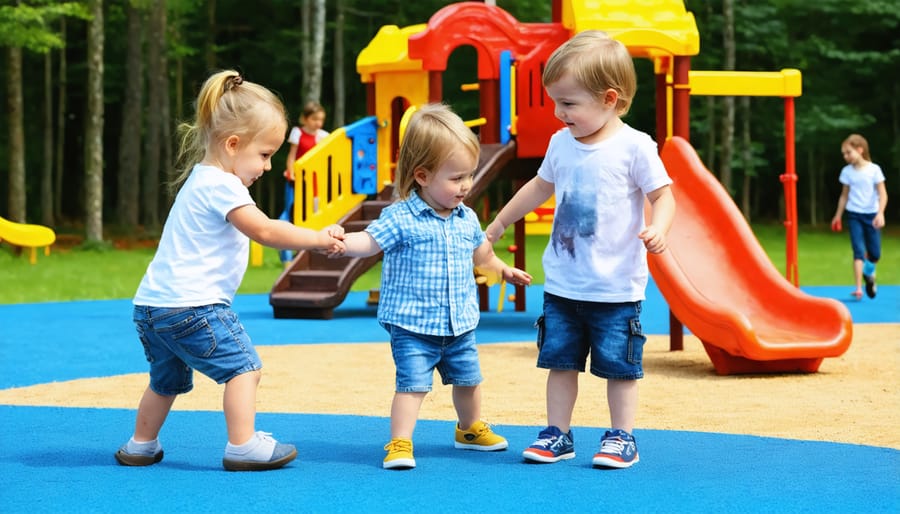
Key Social Skills Milestones: What to Expect at Different Ages
Early Years (2-5)
During ages 2-5, children begin their exciting journey into social interaction. At this stage, they’re learning fundamental skills like sharing toys, taking turns, and expressing their feelings through words rather than actions. While they may still struggle with managing big emotions, this is perfectly normal and part of their development.
Toddlers typically start with parallel play, playing alongside other children rather than directly with them. As they approach preschool age, they begin engaging in cooperative play and forming their first friendships. They also learn to recognize others’ emotions and show early signs of empathy, like offering a toy to a crying friend.
Parents can support this development by arranging playdates, modeling positive social interactions, and praising cooperative behaviors. Simple activities like pretend play and taking turns during games help build these essential skills. Remember that each child develops at their own pace, and some may need more time or support to master certain social abilities.
Keep conversations open and gentle, creating safe spaces for your child to practice these new skills without fear of judgment. Regular opportunities for social interaction, combined with patient guidance, help establish a strong foundation for future relationships.
School Age (6-11)
During the elementary school years, children’s social skills become increasingly sophisticated as they navigate more complex peer relationships and group dynamics. They begin developing deeper friendships, understanding social hierarchies, and learning to cooperate in team settings.
Children at this age typically show greater empathy and can better understand others’ perspectives. They learn to read social cues, adjust their behavior in different situations, and develop conflict resolution skills. Group play becomes more structured, with organized games and activities requiring turn-taking and rule-following.
Many children start forming close friendships based on shared interests rather than just proximity. They become more aware of social status and peer acceptance, which can influence their behavior and self-esteem. This is also when they begin developing their own social identity and understanding of group dynamics.
Parents can support this development by encouraging positive peer interactions, helping children process social challenges, and modeling healthy relationship skills. Organizing playdates, encouraging participation in group activities, and teaching problem-solving strategies can help children build strong social foundations during these crucial years.
Remember that each child develops at their own pace, and some may need extra support in certain areas of social development.
Pre-teens (11-13)
During the pre-teen years, social dynamics become increasingly complex as children navigate changing friendships, group dynamics, and emerging romantic interests. They develop more sophisticated understanding of social hierarchy and peer influence, while managing both in-person and digital social interactions. At this stage, pre-teens typically become more aware of social nuances, including body language, tone of voice, and subtle social cues.
They start forming closer friendships based on shared values and interests rather than just proximity or convenience. Many pre-teens also begin developing their social identity, experimenting with different friendship groups and ways of expressing themselves. They’re learning to handle conflicts independently, develop empathy for others’ perspectives, and understand the importance of loyalty and trust in relationships.
This period is crucial for developing social resilience and authentic connections while maintaining healthy boundaries.
Supporting Your Child’s Social Development
Creating Social Learning Opportunities
Creating opportunities for social interaction is essential for developing strong social skills. While children naturally engage with others during school hours, intentionally planning additional social experiences can significantly boost their development.
Structured activities like team sports, dance classes, or scout groups provide excellent frameworks for practicing social skills under adult guidance. These organized settings help children learn turn-taking, cooperation, and following social rules while interacting with peers their age.
Unstructured playtime is equally valuable. Arrange playdates, visit local playgrounds, or participate in community events where children can freely interact. These casual settings allow kids to practice initiating conversations, negotiating, and resolving conflicts independently.
While maintaining healthy screen time boundaries, you can also incorporate supervised online social activities, such as virtual book clubs or monitored multiplayer games, which can help children develop digital social skills.
Create opportunities at home by involving children in family game nights, shared meals, or collaborative projects. These activities naturally encourage conversation, emotional expression, and bonding while building social confidence in a safe environment.
Remember to observe your child’s comfort level and gradually increase social exposure. Some children may need more time to warm up to group settings, while others dive right in. The key is providing varied opportunities while remaining supportive and patient throughout their social learning journey.
Teaching Through Example
Children learn best by watching and imitating those around them, making parents and caregivers their most influential social skills teachers. When you model positive social interactions in your daily life, you’re providing valuable real-world lessons that children naturally absorb and replicate.
Start by demonstrating basic courtesies in your everyday interactions. Say “please” and “thank you” genuinely, maintain appropriate eye contact during conversations, and show active listening when others speak. These seemingly simple behaviors lay the foundation for children’s social understanding.
Practice what you preach by managing your own emotional regulation skills during challenging situations. When you’re frustrated at the grocery store or dealing with a difficult phone call, narrate your coping strategies out loud: “I’m feeling frustrated right now, so I’m going to take three deep breaths to calm down.”
Create opportunities for your child to observe positive social interactions in various settings. Whether it’s at family gatherings, playground visits, or community events, point out examples of good social behavior: “Did you notice how Sarah shared her toys with Jake? That was very kind of her.”
Remember that children also learn from how we handle social mistakes. When you make an error, acknowledge it openly and model how to make amends: “I interrupted Daddy earlier. I should apologize and wait for my turn to speak next time.”
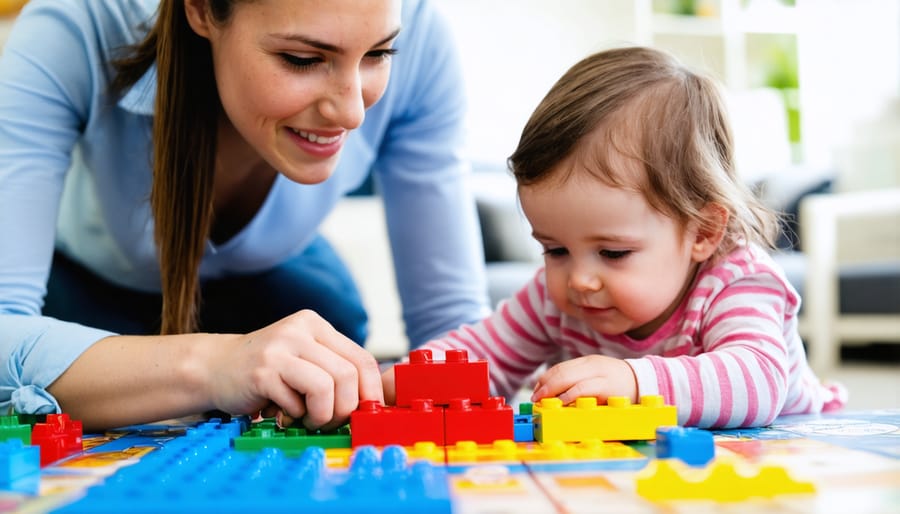
Reinforcing Positive Social Behaviors
Positive reinforcement plays a crucial role in developing strong social skills in children. When we acknowledge and celebrate good social behaviors, we encourage children to repeat these actions and gradually build them into lasting habits.
One effective strategy is to offer specific praise rather than general comments. Instead of saying “good job,” try “I noticed how you shared your toys with Sarah – that was very kind of you!” This helps children understand exactly which behaviors are valued and why they matter.
Dr. Sarah Thompson, a child development specialist, suggests creating a “catching kindness” system where family members or classmates can recognize each other’s positive social interactions. “When children receive recognition from their peers, it often has an even stronger impact than praise from adults,” she explains.
Consider implementing these practical reinforcement techniques:
– Create a kindness chart where children earn stickers for positive social interactions
– Share specific examples of good social behavior during family dinner discussions
– Write short notes acknowledging thoughtful actions
– Use role-play to practice and celebrate successful social interactions
Remember that timing matters – immediate recognition of positive behavior is most effective. Also, be consistent with your reinforcement while gradually reducing external rewards to help children develop intrinsic motivation for maintaining good social skills.
Avoid using material rewards as the primary motivation. Instead, focus on helping children understand how their positive social behaviors make others feel and contribute to meaningful relationships.
When to Seek Professional Help
Red Flags in Social Development
Recognizing potential social development concerns early can help ensure children receive timely support. While every child develops at their own pace, certain behaviors may signal the need for additional attention and guidance.
Watch for children who consistently avoid eye contact or struggle to respond when others speak to them. A child who plays alone exclusively, even when opportunities for group play are available, might need help developing social connections. Similarly, difficulty reading facial expressions or understanding personal space boundaries can indicate social challenges.
Other warning signs include:
– Trouble taking turns or sharing with peers
– Difficulty managing emotions during social interactions
– Limited interest in other children
– Inability to follow social rules or understand social cues
– Aggressive or inappropriate responses to routine social situations
– Extreme anxiety in group settings
– One-sided conversations or fixation on specific topics
– Challenges adapting to changes in social routines
Remember that occasional display of these behaviors is normal, especially during transitions or stressful periods. However, if you notice persistent patterns affecting daily life, consulting with your child’s pediatrician or a child development specialist can provide valuable guidance and support.
Early intervention often leads to better outcomes, so trust your instincts if you feel concerned about your child’s social development. Many effective strategies and resources are available to help children build stronger social skills.
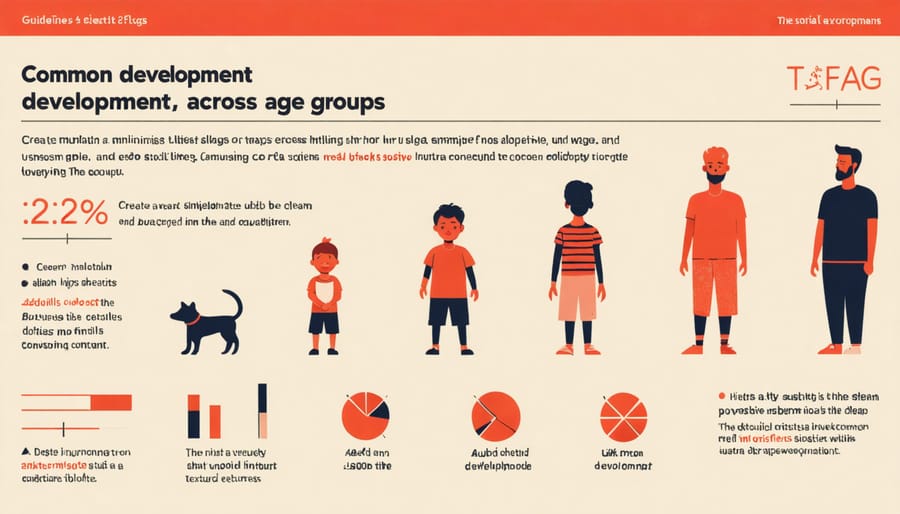
Available Support Options
When it comes to supporting your child’s social development, numerous professional services and interventions are available. Early intervention specialists and child psychologists can provide targeted assistance through evidence-based programs and therapies tailored to your child’s specific needs.
Speech and language therapists often play a crucial role, helping children develop better communication skills and understand social cues. Occupational therapists can work on sensory processing and motor skills that impact social interactions, while behavioral therapists may use techniques like social skills training and role-playing exercises to build confidence and competence.
Many schools offer social skills groups where children can practice interactions in a supervised, supportive environment. These groups typically focus on turn-taking, sharing, conversation skills, and emotional regulation through structured activities and peer interaction.
For children who need additional support, cognitive behavioral therapy (CBT) can be particularly effective in addressing social anxiety and building coping strategies. Some children may benefit from play therapy, which allows them to express themselves and learn social skills through natural play experiences.
Parent training programs are also available, providing caregivers with strategies to support their child’s social development at home. These programs often include workshops, coaching sessions, and practical tools for implementing social skill-building activities in daily life.
Remember that support needs can vary greatly, and what works for one child may not work for another. Consulting with your child’s pediatrician or a child development specialist can help determine the most appropriate interventions for your situation.
Supporting children’s social development is an ongoing journey that requires patience, understanding, and consistent engagement from parents, educators, and caregivers. Throughout their developmental stages, children acquire and refine various social skills that serve as building blocks for their future relationships and emotional well-being.
As we’ve explored, social development encompasses many crucial aspects: from basic communication and emotional recognition in early childhood to complex friendship dynamics and conflict resolution in later years. The key is to remember that each child develops at their own pace, and what matters most is providing them with the right support and opportunities to grow.
Parents and caregivers play a vital role in this process by creating safe, nurturing environments where children can practice their social skills. Whether through structured activities, everyday interactions, or guided play, each moment presents an opportunity for social learning and growth. Remember that modeling positive social behaviors remains one of the most powerful teaching tools at your disposal.
It’s equally important to celebrate progress while maintaining realistic expectations. Small victories, such as sharing toys without prompting or showing empathy toward a upset friend, deserve recognition as significant milestones in your child’s social development journey.
For children who may need additional support, early intervention can make a substantial difference. Don’t hesitate to reach out to professionals if you notice persistent challenges in social interaction or communication. Many resources and specialists are available to help guide both you and your child through any difficulties.
Looking ahead, continue to foster open communication with your child about their social experiences and feelings. Create opportunities for them to practice new skills in various settings, and remain attentive to their changing social needs as they grow. Remember that setbacks are normal and can serve as valuable learning experiences.
By maintaining a supportive, understanding approach to social development, you help lay the foundation for your child’s future relationships and emotional intelligence. Every child has the potential to develop strong social skills when given the right combination of guidance, practice, and encouragement.
Your consistent effort in supporting your child’s social development today will contribute to their confidence, resilience, and ability to form meaningful connections throughout their life. Keep fostering these essential skills while celebrating the unique journey of your child’s social growth.

